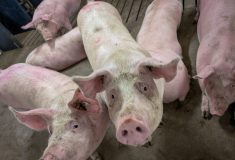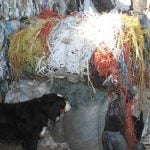Trade deals are helpful to the meat industry only when companies have employees to slaughter cattle and hogs, says a Maple Leaf Foods spokesperson.
“You can only take advantage if you can competitively produce a product in Canada,” said Rory McAlpine, vice-president of government relations at Maple Leaf.
“There’s a disconnect in failing to address the labour challenges that we face.”
McAlpine said the industry is already dealing with a hog shortage, and the federal government’s recent reforms of the Temporary Foreign Worker Program are not helpful.
Read Also

USDA considering economic aid for farmers this fall, says secretary
The U.S. Department of Agriculture is working with Congress to evaluate whether economic aid might be needed for the nation’s farmers this fall amid trade disputes and record-high yields, Agriculture Secretary Brooke Rollins said on Monday.
“We’re struggling for a number of reasons with competitiveness,” he said.
“It’s not going to make it any easier to operate plants.”
Employment and social development minister Jason Kenney introduced changes to the temporary foreign worker program in June, including a 10 percent cap on the percentage of foreign employees at a workplace and cutting the length of time a temporary foreign worker can spend in Canada from two years to one.
Kenney promised to fix the program following alleged abuses by fast food restaurants this spring. Three McDonald’s restaurants in British Columbia allegedly gave more shifts to foreign workers, while a restaurant in Weyburn, Sask., fired long-time waitresses to hire foreign labour.
McAlpine said the government needed to crack down on the abusers, but many companies use the program sensibly.
“Key industries, like meat … have demonstrated very responsible use of the program and (had) very successful transition of foreign workers to permanent residency.”
McAlpine said Maple Leaf employs approximately 1,200 foreign workers in Western Canada.
“Of those, 917 are now permanent residents,” he said.
“They came in as (temporary) foreign workers, but they’re now permanent residents.”
He said reducing the length of time a temporary foreign worker can stay in Canada from two years to one undermines the practice of transitioning employees to permanent residency and prevents them from becoming stable members of a community.
Foreign workers have to satisfy English language standards to qualify for permanent residency. In many cases, it’s impossible to meet that requirement in one year, McAlpine said.
“By imposing that one year limit … they are really taking the legs out of the successful formula that we and many others in the (meat) industry are using to transition those temporary workers into permanent residency.”
Ron Davidson, the Canadian Meat Council’s director of international trade, government and media relations, said the meat industry is concerned about the reforms.
As part of the changes, employers must reduce their proportion of temporary foreign workers from 30 percent to 10 percent by July 1, 2016.
Davidson said that could be a difficult task for certain meat processing plants because it’s hard to convince Canadians to work at slaughter plants.
“We don’t know more what we can do to recruit Canadians. That’s the problem. The whole industry is trying to do it and we just aren’t getting people.”
McAlpine said most packing plants are located in rural Western Canada, such as the Maple Leaf hog processing plant in Brandon.
The unemployment rate in Brandon is less than four percent, he said.
“There’s no way we can staff (the plant) based on local hiring,” he said.
“It’s not going to get easier. The demographic trends are going to be a continual challenge.”
McAlpine said federal immigration policies are biased in favour of high-skilled professionals, and the federal government doesn’t recognize the value of lower skilled immigrants.
“There’s a lot of difficult work to be done in difficult locations,” he said.
“We would say our country was built on the strength of all kinds of individuals…. Lower skilled workers become a tremendous asset in a community like Brandon. Their kids are now thriving.”
Davidson said leaders of Canada’s meat processing industry have asked for a meeting with Kenney to clarify details and discuss the implications of the changes.
McAlpine wants agriculture minister Gerry Ritz to participate in the meeting.
“We’re hoping minister Ritz can be involved,” he said.
“Obviously he understands very well the consequences of affecting plants, in terms of the livestock industry.”















